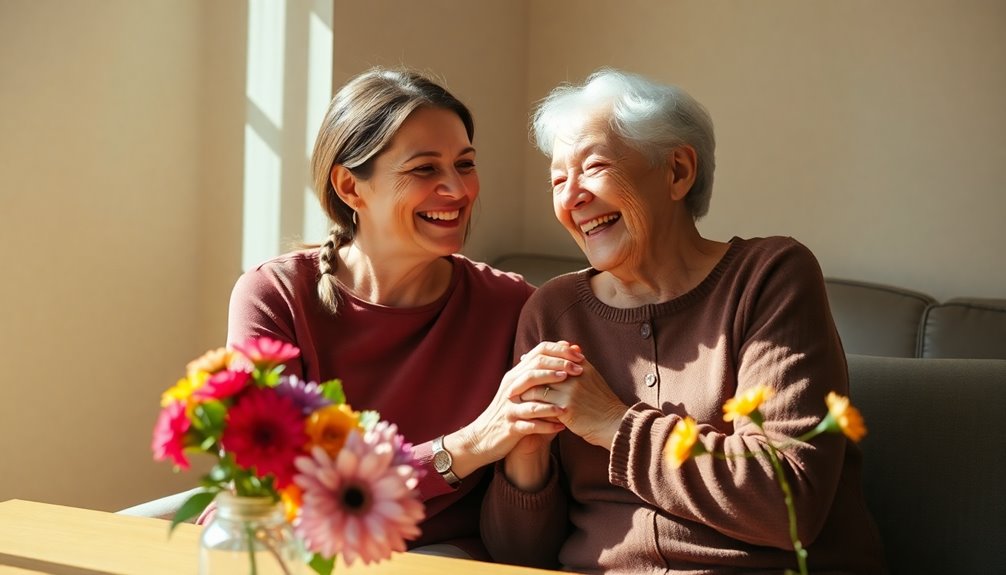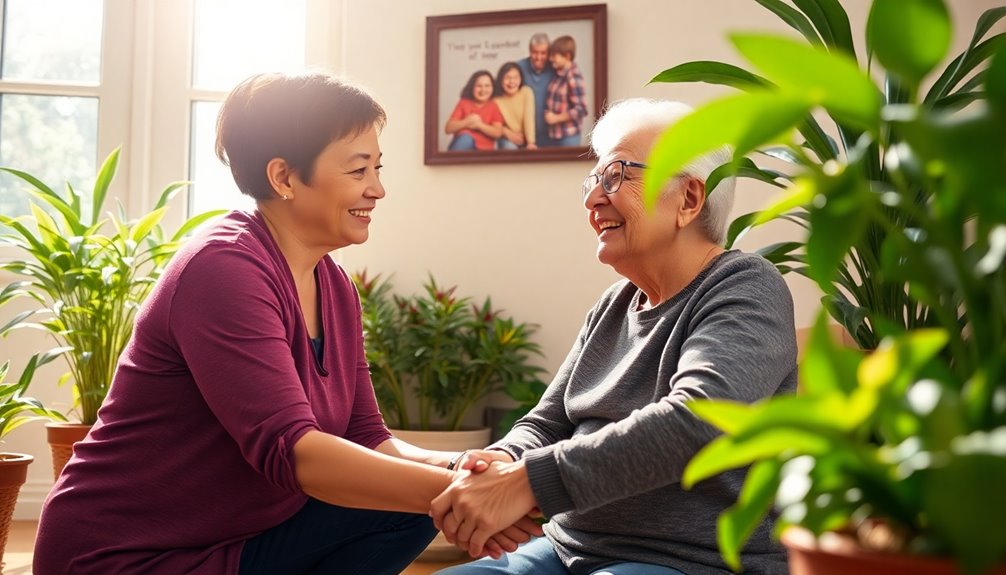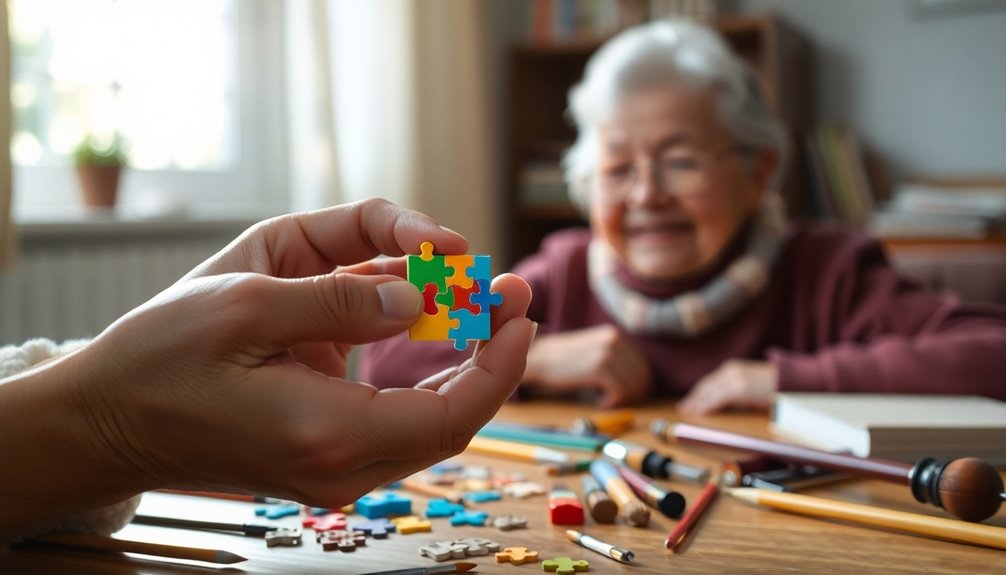Caregiving's rewarding because it lets you make a real difference in people's lives. You build meaningful relationships, helping clients feel less lonely while enriching your own emotional well-being. Embracing daily challenges sharpens your skills and fosters personal growth. You also create supportive environments for families, easing their stress. The joy of companionship, empathy, and compassion drives you to provide the best care possible. Discover more about the fulfilling journey that caregiving offers.
Key Takeaways
- Caregiving fosters meaningful connections, reducing feelings of loneliness for both clients and caregivers while enhancing emotional well-being.
- The role provides opportunities for personal growth, developing skills such as empathy, problem-solving, and communication.
- Engaging with clients' life stories creates enriching experiences that promote a sense of purpose and fulfillment.
- Caregiving allows for the joy of companionship, offering support and reducing isolation for those in need.
- The ability to positively impact clients' lives and alleviate family stress brings a profound sense of accomplishment and satisfaction.
The Impact of Caregiving on Lives

Caregiving not only supports those in need but also profoundly impacts the lives of everyone involved. When you provide essential support, you're helping people maintain their independence and enhancing their quality of life.
Your role reduces feelings of loneliness and isolation, leading to improved emotional well-being for those you care for. This creates a ripple effect, alleviating emotional burdens for family members and fostering a supportive environment.
By assisting with daily activities and providing companionship, you make a huge difference in promoting health and preventing hospitalizations.
Plus, engaging with clients allows you to discover their rich life stories, creating meaningful connections that enrich both your life and theirs.
Ultimately, your efforts lead to a more fulfilling experience for everyone.
Building Meaningful Relationships

In caregiving, you'll find that fostering emotional connections is key to building trust and understanding with your clients.
These meaningful relationships often emerge from shared life experiences, enriching both your life and theirs.
As you grow closer, you create a supportive environment that enhances well-being for everyone involved.
Fostering Emotional Connections
While traversing the emotional landscape of caregiving, you'll find that fostering strong connections with clients can transform the experience for both of you.
As you explore their rich life stories, you'll create emotional connections that enhance your bond. The intimate nature of caregiving encourages deep conversations, allowing you to genuinely understand and support your clients.
In helping others, you reduce feelings of loneliness, not just for them but for yourself as well. These shared experiences often lead clients to see you as honorary family members, enriching your emotional support systems. Additionally, engaging in pet therapy interactions can significantly improve emotional well-being for both caregivers and clients.
Ultimately, the ongoing interactions cultivate lasting fulfillment and a sense of belonging, making the journey of caregiving profoundly rewarding for both you and your clients.
Trust and Understanding
Fostering emotional connections naturally leads to the importance of trust and understanding in caregiving. As you build meaningful relationships with your clients, you become their confidant and companion, creating a safe space for sharing personal stories.
This trust allows you to develop a deep understanding of their individual needs and preferences, enhancing the quality of care you provide. When clients feel valued and understood, their satisfaction increases, positively impacting their overall well-being.
Establishing this trust and understanding not only benefits your clients but also brings you a sense of fulfillment as you witness the positive effects of your support. Additionally, practicing effective relaxation techniques can further strengthen your relationship with clients by reducing stress and promoting a calm environment.
Shared Life Experiences
Sharing life experiences with your clients not only enriches your relationships but also strengthens the emotional bonds that are essential in caregiving. By sharing personal stories, you create a sense of camaraderie that fosters trust and understanding.
These shared life experiences enhance emotional support, allowing you to connect on a deeper level. Engaging in meaningful conversations about the past helps you better understand your clients' backgrounds and needs, leading to personalized care.
The bonds formed through these experiences bring joy and a sense of belonging, reducing feelings of loneliness for both you and your clients. Caregiving becomes more than just a job; it's about creating lasting memories that profoundly reward both you and those you care for. Additionally, practicing mindfulness techniques can further strengthen these connections by fostering present-moment awareness and reducing stress.
The Joy of Companionship

In caregiving, the joy of companionship shines through as you build meaningful connections with those you support. You not only reduce their loneliness but also enrich your own life through shared moments and conversations. Together, you create a bond that fosters happiness and a sense of belonging for both of you. Additionally, incorporating seniors texting humor can enhance interactions and bring laughter to your time together.
Building Meaningful Connections
Although caregiving often focuses on practical support, the heart of this role lies in building meaningful connections.
These connections foster trust and understanding, enhancing emotional well-being for both you and your clients. Through companionship, you help alleviate feelings of loneliness and isolation, enriching lives in profound ways. Additionally, engaging in culturally appropriate practices can deepen these connections, reinforcing the importance of traditional healing practices(traditional healing practices) in providing holistic care.
To deepen these connections, consider:
- Engaging in open conversations about life experiences
- Actively listening to your client's stories and feelings
- Sharing your own experiences to create mutual understanding
- Encouraging clients to express their thoughts and emotions
- Practicing gratitude for the moments you share together
Reducing Loneliness Together
Companionship plays an essential role in reducing loneliness, as it nurtures a sense of belonging and connection.
As a caregiver, you provide invaluable companionship that greatly boosts emotional well-being for both you and your clients. Regular social interactions, like those in caregiving, can lower depression and anxiety risks in older adults. Your presence encourages clients to engage in meaningful activities, helping them maintain a sense of purpose and connection to the world.
Furthermore, you often become a trusted confidant, creating a supportive environment that fosters open communication. By offering companionship, you enhance your clients' quality of life, allowing them to age with dignity while feeling valued and understood. This nurturing connection can lead to personal growth journeys, where both caregivers and clients can discover new strengths and resilience together.
Together, you can combat loneliness and celebrate the joy of companionship.
Embracing Daily Challenges

Caregiving presents a unique set of daily challenges that require you to adapt and think on your feet. Embracing daily challenges not only helps you learn new skills but also fosters resilience as you navigate various situations.
Each day brings opportunities to enhance your problem-solving abilities and emotional intelligence. Here are some aspects to appreciate:
- Assisting with personal care tasks
- Managing medication effectively
- Preparing nutritious meals
- Handling unexpected scenarios
- Building meaningful connections with clients
Successfully managing these complexities instills a sense of accomplishment and reinforces your commitment to making a positive difference in your clients' lives. Additionally, being aware of potential side effects of medications can enhance your ability to provide safe and effective care.
Embracing these challenges enriches both your caregiving experience and your personal growth journey.
Personal Growth Through Caregiving

When you embrace the challenges of caregiving, you open the door to significant personal growth.
By stepping outside your comfort zone, you enhance your problem-solving abilities and develop emotional intelligence. Steering complex emotions and individual needs fosters a deeper sense of empathy, allowing you to connect more meaningfully with others.
The dynamic nature of caregiving tasks lets you acquire new skills—like meal preparation and medication management—that contribute to both your personal and professional development.
Regular interactions with clients sharpen your interpersonal skills, improving your relationships with colleagues and family.
Furthermore, facing daily challenges builds resilience, helping you cope with stress and find fulfillment in your role, ultimately boosting your self-confidence. Additionally, understanding the impact of temperament on behavior can inform your approach, enhancing your effectiveness as a caregiver.
The Importance of Empathy and Compassion

How can empathy and compassion transform the caregiving experience? When you practice these traits, you create a nurturing environment that enhances well-being.
Empathy allows you to understand your clients' emotions, while compassion fosters trust. This connection can lead to remarkable outcomes, such as:
- Reduced feelings of loneliness and anxiety.
- Improved mental health for clients.
- Greater compliance with care routines.
- Personalized care that respects individual needs.
- Stronger emotional bonds, increasing job satisfaction for you.
The Fulfillment of Making a Difference

Making a difference in someone's life brings a profound sense of fulfillment that few experiences can match.
As a caregiver, you directly impact the lives of elderly or disabled clients, enhancing their independence and quality of life. Your companionship and emotional support greatly reduce feelings of loneliness, fostering a sense of belonging.
By assisting with daily tasks like meal preparation and personal hygiene, you alleviate stress for family members, providing them peace of mind.
Witnessing the positive changes in your clients' well-being offers you a deep sense of accomplishment. Engaging in meaningful interactions not only boosts their mental health but also enriches your life, creating shared experiences that enhance your personal growth and overall fulfillment.
Discovering New Skills and Experiences

As you immerse yourself in caregiving, you'll discover a wealth of new skills and experiences that not only enhance your professional capabilities but also enrich your personal life.
You'll face daily challenges that sharpen your critical thinking and adaptability. Engaging with diverse clients broadens your understanding of various cultures and lifestyles, deepening your appreciation for the human experience.
Here are some skills and experiences you can gain:
- Meal preparation and nutrition planning
- Medication administration and basic medical care
- Ongoing education in areas like diabetes management
- Compassionate communication and interpersonal skills
- Problem-solving in real-life situations
Additionally, learning about newborn sleep patterns can provide vital insights into caring for infants, enhancing your ability to support families during this crucial time.
These opportunities shape you into a more competent and empathetic individual, making caregiving a truly rewarding journey.
Creating a Supportive Environment for Families

Creating a supportive environment for families is crucial in caregiving, especially when you consider the emotional and logistical challenges they face.
As a caregiver, you play a significant role in fostering strong relationships with both clients and their families. By enhancing communication and understanding, you help families navigate the complexities of healthcare systems, ensuring their loved ones receive the appropriate medical attention. In addition to providing emotional support, it’s important to address practical needs, such as comfort and appropriateness in caregiver attire. With a variety of caregiver clothing options explained, you can choose outfits that not only reflect professionalism but also provide ease of movement for daily tasks. This thoughtful approach underscores your commitment to delivering high-quality care while promoting a positive environment for both clients and their families.
Regular updates and check-ins keep families informed about their loved one's condition, promoting transparency and trust. Additionally, the emotional support you provide not only benefits your clients but also alleviates stress for family members, creating a more harmonious home environment.
Ultimately, your dedication to support strengthens the bond between caregivers and families, ensuring everyone feels valued and understood.
Frequently Asked Questions
Why Do You Enjoy Caregiving?
You enjoy caregiving because it lets you make a real difference in someone's life.
Each day, you face unique challenges that keep your work exciting and dynamic.
Building deep relationships with clients feels rewarding, as you often become part of their extended family.
You love learning new skills, from meal prep to medication management, which not only enhances your abilities but also contributes to your personal growth and fulfillment.
How to Answer Why Do You Want to Be a Caregiver?
When answering why you want to be a caregiver, focus on your passion for making a difference in others' lives.
Emphasize your desire to assist with daily activities and provide emotional support.
Talk about how you value building meaningful relationships with clients and enjoying the variety of tasks that come with the role.
Finally, highlight your commitment to personal growth and learning as you adapt to each unique individual's needs.
Why Do You Enjoy Being a Carer?
You enjoy being a carer because it lets you make a real difference in people's lives.
You build strong relationships with clients, which brings emotional fulfillment and a sense of belonging.
Each day presents unique challenges that keep your work engaging and rewarding.
You appreciate providing companionship, reducing loneliness for others while enriching your own life.
The gratitude you receive from clients and their families reinforces your passion and makes you feel valued.
Why Have You Chosen to Be a Caregiver?
You've chosen to be a caregiver because you see the value in lending a hand, sharing a smile, and offering support.
You thrive on making a difference, building connections, and fostering independence. Each day brings new challenges, keeping your work dynamic and fulfilling.
You find satisfaction in knowing your efforts enhance others' lives, and you embrace the personal growth that comes from developing new skills and strong relationships in this rewarding role.
Conclusion
In the end, caregiving is like planting a garden; with patience and love, you watch relationships bloom and grow. The joy of companionship, the fulfillment of making a difference, and the personal growth you experience are all part of this rewarding journey. Embracing challenges and nurturing empathy not only enriches the lives of those you care for but also transforms your own. So, immerse yourself in the world of caregiving, and let the beauty of connection flourish.









